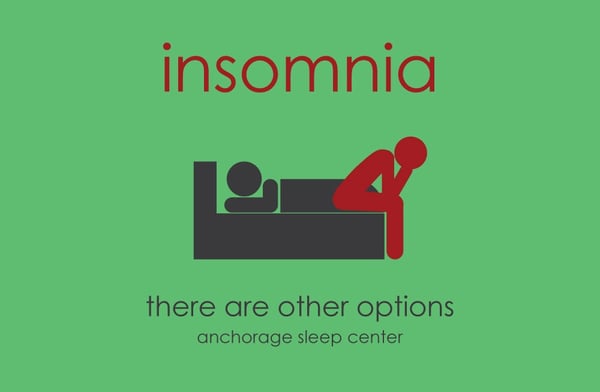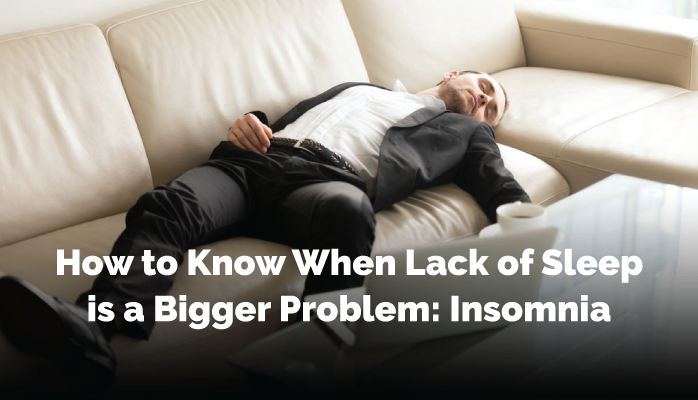Insomnia Isn't So Simple
Insomnia is somewhat of a complex topic because it's not as simple as "I can't sleep." In fact, there are actually two types of insomnia, and two modes of insomnia. Here's a closer look at how to distinguish these types/modes of insomnia
The two types of insomnia are:
- Primary insomnia – insomnia as a direct result of something else
- Secondary insomnia – insomnia with no clear, underlying issue
The two modes of insomnia are:
- Acute insomnia – short term, a month or less
- Chronic insomnia – symptomatic, long term (at least three times per week for a month or more)S
So in total, there are actually four different combinations of mode/type meaning that your insomnia might look different than someone else's insomnia. Continue reading to learn more about insomnia and sleeplessness.
How to Know When a Lack of Sleep is a Bigger Problem: Insomnia
Symptoms of insomnia include:
- Much difficulty getting or staying asleep
- Mood problems
- Anxiety
- Depression
- Fogginess and tiredness
- Performance troubles
- Cognitive impairment
- Poor quality of life
- Occupational injury
The long-term effects of insomnia include a conglomerate of serious medical problems, including increased risk of [WebMD]:
- Psychiatric problems
- High blood pressure
- Dying younger
- Hear failure and heart attack
- Memory loss
- Weight gain
- Chronic poor performance in nearly every aspect of life
Truly, the most immediate detrimental effects of insomnia-induced sleep deprivation are centered on potential degradation of social relationships, physical and cognitive performance, and emotional relationships. Depending on the severity of the insomnia and sleep loss, these depredating effects can be crippling.
Causes of Short and Long-term Insomnia
Primary insomnia is insomnia with causes you can clearly identify. Some short-term examples include:
- Short term illness
- Jet lag
- Switching shifts at work
- Temporary regimens of medication
- Travel
- Significant stress (divorce, job loss, death of loved one, moving)
Acute insomnia often clears up after some time has elapsed, and primary insomnia often resolves itself when the root cause of the insomnia is addressed.
Causes of chronic, long-term insomnia are contributed to by any of the following:
- Age-related sleep changes
- Chronic stress
- Chronic anxiety
- Depression
- Chronic pain
- Circadian rhythm disorders
- Dependence on certain medications
- Habitual life style choices
- Chronic substance abuse
- Especially in Alaska, seasonal effects or transitions (light/dark extremes)
Who is Most at Risk for Insomnia
There are many risk factors for developing insomnia. Causes can range from natural biological changes to external, chronic environmental stressors.
For example, one biological factor is your sex: insomnia is more common in women than men. Biological aspects of being female like pregnancy, premenstrual syndrome, and menopause can increase your risk for developing insomnia.
Also, as we age our sleep cycles change. We tend to go to bed earlier, wake up earlier, and require naps during the day to get the right amount of sleep. People over the age of 60-65 are more likely to have insomnia and report trouble with sleep.
People with certain underlying psychological conditions are at risk for developing primary insomnia, such as:
- Depression
- Anxiety
- Stress from marriage/job/health issues
Many diseases can also affect our ability to sleep, and put us at risk for developing insomnia:
- Diabetes
- Kidney disease
- Lung disease
- Arthritis
- Heart disease
- Heavy smoking
- Sleep apnea
- Restless leg syndrome (RLS)
- Addiction
- Parkinson’s disease
- Alzheimer’s disease
- Mental disease
People who take certain medications are also at risk for insomnia (primary) as a side effect. Medications include:
- Diet pills
- Steroids
- High blood pressure medications
- Theophylline
- Phenytoin
- Levadopa
- Decongestants
In short, there are so many things that may make you at risk for insomnia - which can be frustrating if you are experiencing insomnia and don't know why. Sleep specialists can help with this.

Treatment for Acute and Chronic Insomnia
Insomnia should be treated differently depending on what type of insomnia you have. Acute insomnia will likely go away on its own – once the cause is removed you will likely be sleeping well again.
Chronic insomnia treatments may be a little less straightforward, and will likely require some intervention, usually, behavioral therapy. This might include:
- Therapy
- Education on good sleep habits
- Lifestyle changes
- Ways to reduce severity of chronic causes (such as pain treatment)
- Avoiding screens before bedtime
It is not recommended to treat chronic insomnia with over the counter pills, such as melatonin, because they may have undesired side effects and lose their effectiveness over time.
Treating insomnia will likely require direct consultation with your doctor or a sleep specialist, and may require trial and error to narrow down possible causes and best treatment options.
If you live in Alaska and are worried that you are struggling with insomnia, please contact one of our sleep specialists by clicking the orange button below and taking a free online sleep test.


